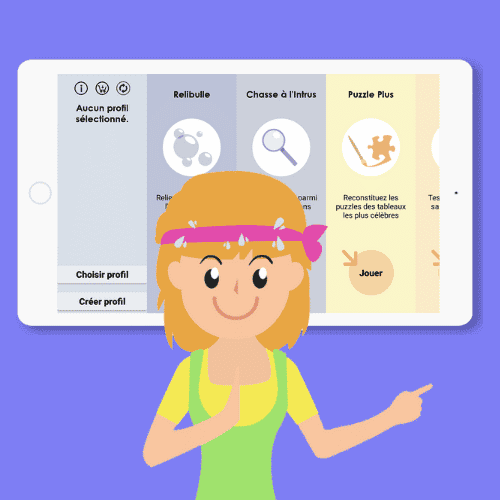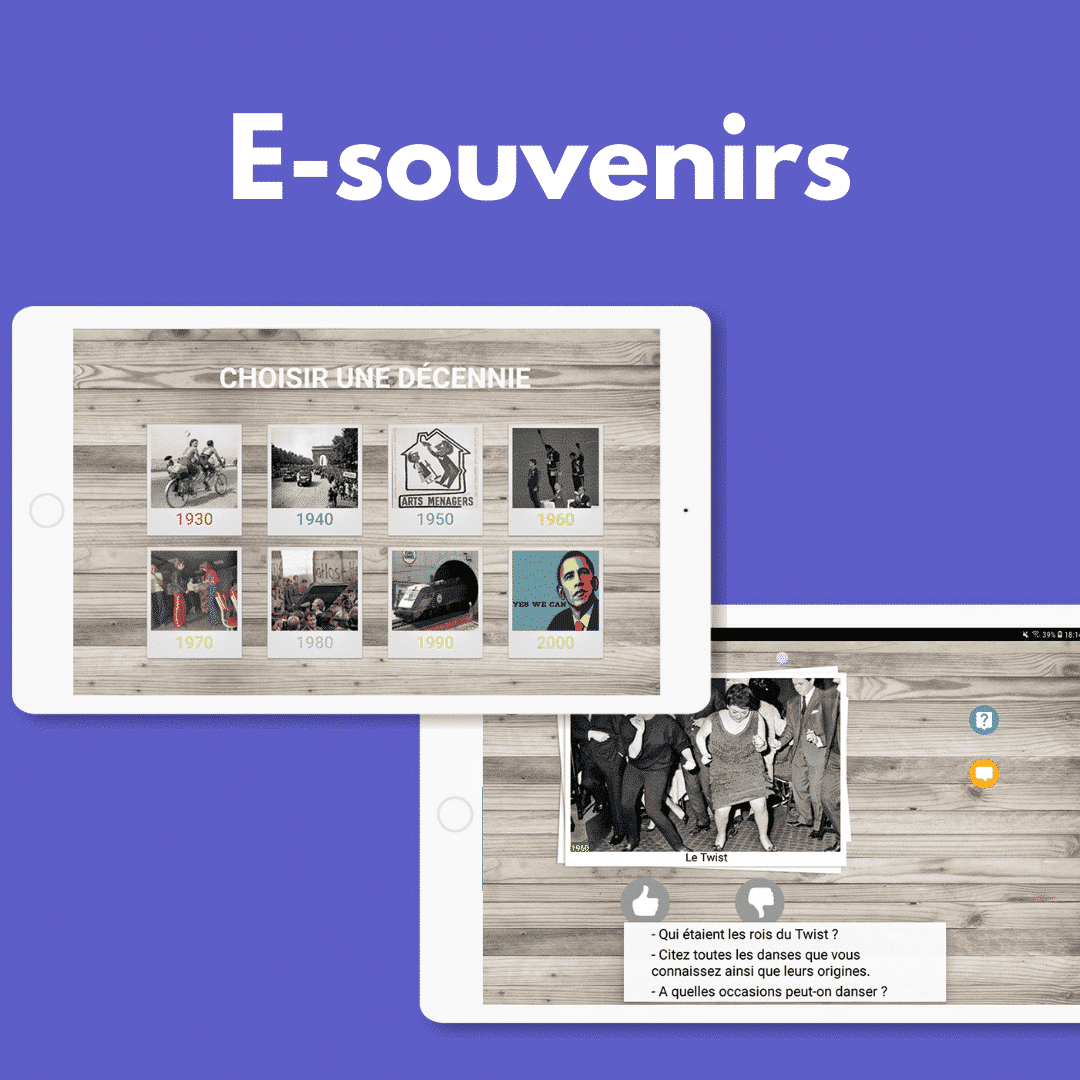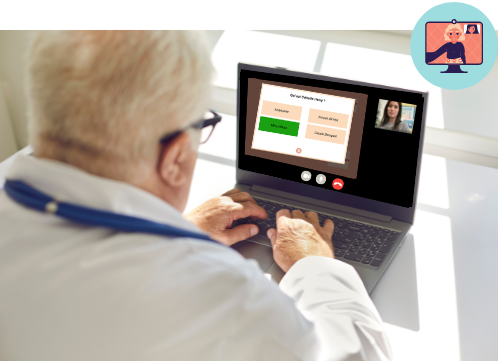USING NON-PHARMACOLOGICAL THERAPIES TO FIGHT ALZHEIMER’S DISEASE
Jeannette introduces you today to non-pharmacological therapies to naturally alleviate the consequences of Alzheimer’s’s disease. These therapies are tailored for each person based on their desires, tastes, and environment.
As people age, more and more elderly people find themselves affected by Alzheimer’s’s disease. Disoriented, they are troubled by fears, as the brain does not recognize the environment it is in. To help calm these sometimes unbearable anxieties, non-pharmacological therapies for Alzheimer’s’s have been implemented.
IMPORTANCE OF NON-PHARMACOLOGICAL THERAPY FOR ALZHEIMER’S
While memory loss is at the core of Alzheimer’s’s issues, the consequences of this disease are generally what causes the most harm to the patient and to those who care for them. It is therefore essential to establish therapies that have a non-pharmacological approach to behavioral disorders. They will help reduce cognitive disorders while promoting a restoration of lifestyle habits.

However, it is imperative to find the most suitable treatment for patients so that it can meet their needs in terms of lifestyle, history, and the disorders manifested. These solutions should be implemented as soon as the first symptoms appear to prevent a worsening of the situation.
Here, we will present some non-pharmacological therapies that have proven effective. While it is essential to establish a non-pharmacological treatment based on the individual, some solutions are more suitable than others.
ACTIVATING MEMORY THROUGH MEMORIES
This non-pharmacological therapy in nursing homes or at home is essential for recalling memories for the person suffering from Alzheimer’s’s disease. This solution requires little knowledge; to use it, simply browse through a photo album or take the time to listen to the patient recount a story they cherished. If they were very involved in their work, why not have them talk about their profession or a field that has always sparked their passion? You can also use the E-Memories app on a tablet, designed with speech therapists.

ENCOURAGEMENT THROUGH THE MONTESSORI METHOD
This technique known as Montessori was originally developed to boost the self-confidence of children with difficulties. Nowadays, it has been adapted for elderly people to prevent them from facing failure. The idea is to have them perform basic exercises related to their professional field. However, it should not be perceived as work. To succeed in this task, one must observe their potential.

DEVELOPING MEANS OF EXPRESSION THROUGH ART THERAPY
Also known as art therapy, this technique uses various means of expression to allow the patient’s brain to regain its episodic and semantic memory. This will ease anxieties and provide a positive boost to the patient. It is important that the activities highlighted bring joy to the person you are accompanying and help them recall memories and details that made them happy.

SENSORY STIMULATION THROUGH AROMATHERAPY
This non-pharmacological approach to Alzheimer’s’s disease known as aromatherapy is a sensory solution that uses scents to awaken perceptive memory. Whether through massage or diffusion, the patient will experience peaceful sleep and rediscover scents that remind them of important people.

RETURN TO CALM AND ZOOTHERAPY
Widely used among those who have had pets, this method known as animal meditation is very present in nursing homes. To do this, animals are specially selected to visit elderly people. These animals of various species are used by educators to provide affection to the seniors. This stimulates motor skills, cognitive abilities, and especially enhances their psychoaffective state.
Are you looking for non-pharmacological therapeutic activities to help with Alzheimer’s’s disease?
A PROGRAM TO SUPPORT PEOPLE WITH ALZHEIMER’S
SCARLETT

A PROGRAM ON REMINISCENCE AND MEMORIES FOR WELL-BEING
E-MEMORIES

Be supported online by a memory training coach
Book one-hour sessions with our DYNSEO expert. During the coaching, using the COCO app, Clint or Scarlett, the expert will suggest certain games based on the cognitive functions you wish to improve (attention, memory, language…). They can thus recommend the best games to achieve your goal and provide you with strategies to implement.
The coaching can be booked by:
- Individuals who want to be supported in their use of our programs: training at home alone can be difficult. One can lose motivation if there is no one to play with. Sometimes, it is a relative who takes care of initiating cognitive stimulation activities, but it requires patience, and going through an external person can be simpler.
- Individuals who are being followed by healthcare professionals but also do activities at home: between sessions with the professional, you can train at home. The expert can recommend the most suitable games for your needs.
- Individuals who are waiting to start a therapeutic journey: the waiting times to schedule an appointment with a speech therapist can be very long. During the wait, you can start your cognitive training and be followed by our expert to do activities together.

If you or your loved ones have cognitive disorders or vulnerabilities, it is important to be followed by a doctor or healthcare professional. Coaching is a support tool for using our tablet programs. It does not replace a speech therapy assessment. If you are using our programs because you have a disease, please discuss it with your doctor.

A quick appointment
Without leaving your home

Personalized advice to meet your needs
THE BENEFITS OF MUSIC THERAPY FOR ALZHEIMER’S PATIENTS
Music therapy is a non-pharmacological approach that uses music to improve the quality of life of patients with Alzheimer’s’s disease. Music has the power to awaken memories and soothe emotions. It can also promote communication and connection between the patient and their surroundings. Here are some benefits of music therapy:
- Cognitive stimulation: Music activates different areas of the brain, which can help stimulate memory and concentration.
- Reduction of anxiety: Listening to soothing music can decrease anxiety and stress levels in patients.
- Improvement of mood: Music can evoke positive emotions and enhance the mood of patients.
- Facilitation of social interactions: Music therapy encourages exchanges and interactions between patients and their loved ones or caregivers.
PLAY THERAPY: AN EFFECTIVE TOOL FOR ALZHEIMER’S PATIENTS
Play therapy is a method that uses adapted games to stimulate the cognitive abilities of people with Alzheimer’s’s. These games can be both fun and educational, allowing patients to remain engaged and mentally active. Here are some types of beneficial games:
- Memory games: These games help strengthen memory capabilities by engaging short-term and long-term memory.
- Puzzles: Puzzles promote concentration and problem-solving while being a relaxing activity.
- Board games: Board games encourage social interactions and strengthen emotional bonds.
- Digital applications: Applications specifically designed for elderly people can offer suitable cognitive exercises.
THE ROLE OF PALLIATIVE CARE IN THE MANAGEMENT OF ALZHEIMER’S DISEASE
Palliative care aims to improve the quality of life of patients suffering from serious illnesses, including Alzheimer’s’s disease. These services focus on relieving symptoms and providing psychological support for both the patient and their family. Key elements of palliative care include:
- Pain management: Assessment and treatment of pain to ensure the patient’s comfort.
- Psychological support: Providing emotional support to help the patient and their family cope with the illness.
- Care coordination: Working with a multidisciplinary team to ensure comprehensive and tailored care.
- Education: Informing the family about the disease and helping them understand the patient’s needs.
THE ADVANTAGES OF PHYSICAL EXERCISE FOR ALZHEIMER’S PATIENTS
Physical exercise is essential for maintaining the physical and mental health of people with Alzheimer’s’s disease. It helps improve blood circulation, strengthen muscles, and promote overall well-being. Recommended physical activities include:
- Walking: A simple and accessible activity that can be practiced daily.
- Yoga: Gentle exercises that improve flexibility and relaxation.
- Dance: A joyful activity that stimulates memory and promotes social interactions.
- Group exercises: Participating in fitness classes tailored for seniors to enhance motivation and social connections.

